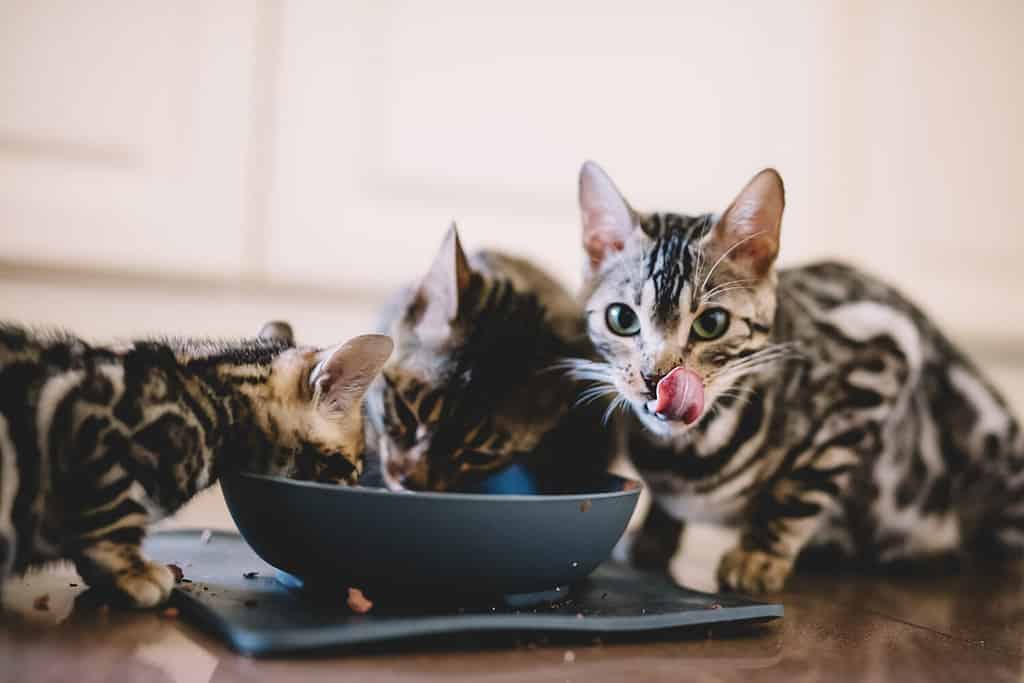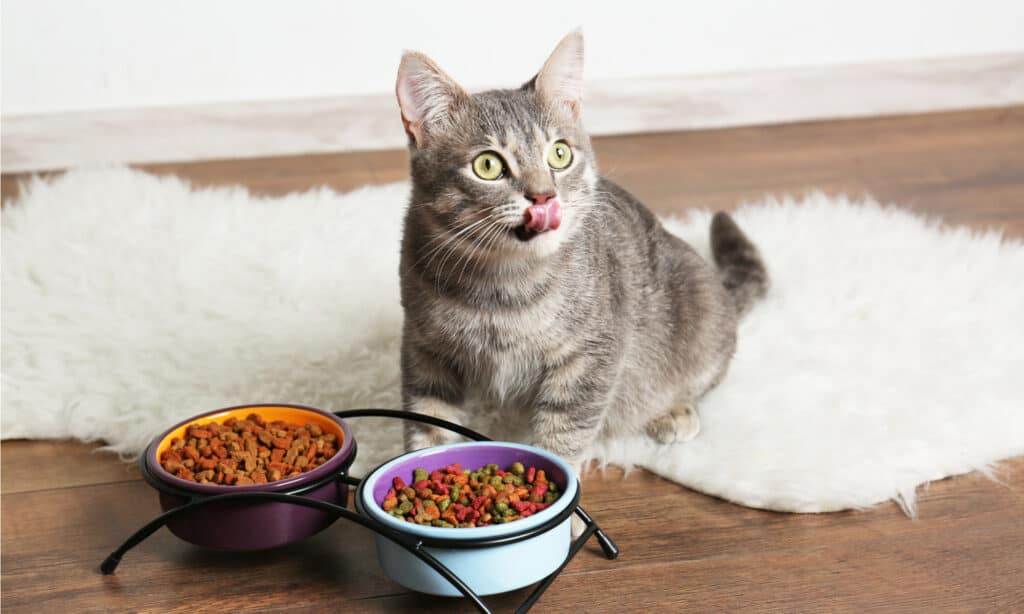You may have seen cats eating eggs in short clips on social media or you may have been enjoying your own breakfast one day and wondered if your cat can also enjoy this protein source. You want your cat to enjoy the best cat food available. But can cats eat eggs? Here are some things to know before feeding!
Can Cats Eat Eggs?
Cats can eat eggs, so long as they’re cooked. However, you should consider that scrambled eggs deliver both protein and fat to your cat’s diet. This could lead to weight problems like obesity and could cause more severe issues like pancreatitis. Therefore, egg whites are the better alternative when you’re considering adding eggs to your cat’s diet.

Cats can eat eggs, so long as they’re cooked.
©PHOTOCREO Michal Bednarek/Shutterstock.com
Is It Safe for Cats to Eat Eggs?
While cats can eat cooked eggs, raw eggs are a different story. According to the ASPCA, raw eggs are a dangerous addition to your cat’s diet. That’s because they contain E. coli and salmonella, which can be extremely harmful to your cat. Not only that but raw eggs also deliver avidin, which is an enzyme that detrimentally affects your cat’s ability to absorb biotin. In turn, this could cause both skin and coat issues.

Scrambled eggs for humans have seasonings like salt and pepper. Cooked eggs for cats should have neither.
©iStock.com/ito:krblokhin
How Do You Cook Eggs for Cats?
Cooked eggs are definitely an option for your cat, so long as you are being transparent with your veterinarian while you make any changes to your cat’s diet. Unlike your eggs, your cat’s eggs don’t need any salt or seasoning. You can either boil or scramble the egg whites, providing your cat with a great source of protein without any additions. Don’t feed an entire egg, however. This should only be a supplemental food, not the main course. About a tablespoon is enough for your kitty.
Can Cats Eat Cooked Egg Yolk?
Cats could potentially eat cooked egg yolk, but you have to remember that the fat content may be too high for your cat. This could cause weight gain and gastrointestinal issues (even issues like pancreatitis), which could wreak havoc on your cat’s health. Each cat is different both in body composition and age. Nutritional requirements differ from cat to cat so it’s always best to consult with your veterinarian, who has your cat’s medical history, before moving forward with any changes to your cat’s diet.
Can You Mix Egg With Cat Food?
You can serve cooked egg whites along with your cats normal food. Simply use it as a topper. Make sure that after your cat enjoys their regular meal, you thoroughly wash the plate they used.

Cats can enjoy cooked eggs as a topper with their regular food.
©Africa Studio/Shutterstock.com
Health Benefits of Eggs for Cats
Aside from delivering protein to your cat’s diet, eggs also provide your kitty with vitamins B2, B12, A, and linoleic acid. If there is cooked yolk provided, this could deliver monosaturated fat along with omega-3 and omega-6 fatty acids, which promote better nervous system health as well as brain and heart health.
Can Cats Eat Other Types of Human Food?
Your cat may be the type to approach you and stare like a puppy when you’re eating something they deem yummy. It may be a banana in the morning while you dip a spoon into the accompanying yogurt. It might be late at night when you’re feeling indulgent and savoring a few pieces of your favorite chocolate. Your cat might even beg to get a taste of your dog’s food! If you let your cat outside, it might start munching on grass. Review these links to determine if these foods are safe for your cat:
Do Cats Eat Items That Aren’t Food?
Your favorite feline companion may get into items around your home that don’t have a pleasant scent or taste. Yet somehow, they find these items irresistible. While it can be interesting to watch your cat munch on items that don’t resemble food in the slightest, it could be potentially life-threatening if they continuously engage in this behavior.
If your cat eats an object that it can’t digest, it could get stuck while it moves through your cat’s body, requiring emergency surgery. An item that is too large for a cat to swallow could cause your cat to choke. When cats eat items that are not food, what they may have is pica. Pica is a condition that causes cats to eat non-food items like plastic.
The photo featured at the top of this post is © Nataliya Schmidt/Shutterstock.com
Thank you for reading! Have some feedback for us? Contact the AZ Animals editorial team.







